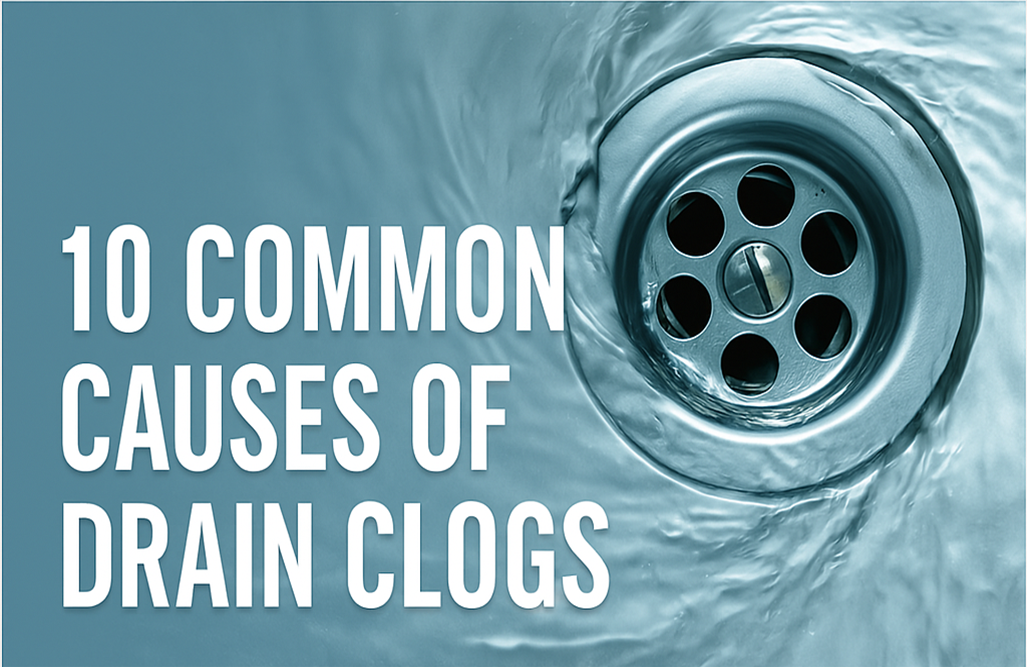Few things are more frustrating than a clogged drain. Whether it's a slow-draining sink, a backed-up shower, or a completely blocked toilet, a drain clog can disrupt your entire day. But what causes these clogs, and how can you prevent them from happening in the first place?
In this article, we’ll break down the 10 most common causes of drain clogs and give you practical solutions to keep your plumbing running smoothly.
1. Hair Buildup
Hair is one of the most frequent culprits of clogged bathroom drains. Over time, strands of hair combine with soap scum and other debris, forming tough blockages that slow water flow.
How to Prevent It:
- Use a drain cover to catch hair before it goes down the drain.
- Clean the drain cover regularly to prevent buildup.
- Flush drains with hot water weekly to break down soap and hair clumps.
2. Soap Scum and Residue
Traditional bar soaps contain fats and oils that combine with minerals in hard water, forming soap scum. Over time, this residue lines the inside of pipes, restricting water flow.
How to Prevent It:
- Switch to liquid soap or body wash, which doesn’t create the same buildup.
- Install a water softener to reduce mineral deposits.
- Flush drains with hot water and vinegar monthly to dissolve soap scum.
3. Food Waste
Kitchen sinks often get clogged from food scraps, especially items like coffee grounds, pasta, rice, and grease that don’t break down easily. Even with a garbage disposal, certain foods can lead to clogs.
How to Prevent It:
- Avoid putting grease, coffee grounds, and fibrous foods (like celery and potato peels) down the drain.
- Use a sink strainer to catch food particles.
- Run hot water and dish soap down the drain after washing greasy dishes.
4. Grease and Oil
Grease may be liquid when hot, but as it cools, it solidifies inside pipes, creating sticky clogs. Cooking oils, butter, and even dairy products can contribute to the problem.
How to Prevent It:
- Never pour grease or oil down the drain. Instead, let it cool and dispose of it in the trash.
- Wipe greasy pans with a paper towel before washing.
- Flush drains with boiling water and dish soap to break up small grease buildups.
5. Flushable Wipes (That Aren’t Really Flushable)
Despite being labeled “flushable,” most wipes don’t break down like toilet paper. They can accumulate in pipes, leading to stubborn blockages.
How to Prevent It:
- Avoid flushing anything other than toilet paper and human waste.
- Keep a small trash can in the bathroom for wipes and other non-flushable items.
6. Foreign Objects (Kids’ Toys, Jewelry, and More)
If you have young children, you’ve probably dealt with unexpected objects in the toilet or sink. Small toys, cotton swabs, dental floss, and jewelry can easily get stuck in pipes.
How to Prevent It:
- Use drain covers to catch small objects before they go down the drain.
- Keep small items away from the sink and toilet area.
- If something falls in, retrieve it immediately before flushing or running water.
7. Tree Roots Invading Pipes
Tree roots naturally seek out moisture, and if your sewer line has even a tiny crack, roots can grow inside and cause serious blockages.
How to Prevent It:
- Be cautious about planting trees near underground pipes.
- Have a plumber inspect your sewer line if you experience frequent clogs or slow drains.
- Consider root barriers or professional root removal treatments.
8. Old or Collapsing Pipes
Over time, pipes can deteriorate, collapse, or become misaligned, restricting water flow. Older homes with galvanized or clay pipes are especially susceptible to this issue.
How to Prevent It:
- If you have an older home, schedule a plumbing inspection to check the condition of your pipes.
- Consider replacing aging pipes before they cause major problems.
9. Poorly Installed Plumbing
Improperly installed drain pipes or a bad slope can lead to slow drainage and frequent clogs.
How to Prevent It:
- Hire a professional plumber to inspect and correct plumbing issues.
- If you notice persistent drain problems in a new home, have the system evaluated.
10. Hard Water Deposits
Hard water contains high levels of minerals like calcium and magnesium, which can form deposits inside pipes, narrowing the openings and causing drainage problems.
How to Prevent It:
- Install a water softener to reduce mineral buildup.
- Use vinegar or commercial descaling solutions to clean pipes periodically.
When to Call a Plumber
While minor clogs can often be handled with a plunger or drain cleaner, some blockages require professional attention. If you experience any of the following, it’s time to call a licensed plumber:
- Multiple drains clogging at the same time
- Slow drainage even after using DIY methods
- Foul odors coming from drains
- Gurgling noises in pipes
- Recurring clogs that keep coming back
At Applause Plumbing & Heating, we specialize in diagnosing and fixing stubborn drain clogs, sewer line issues, and plumbing repairs. If you’re dealing with a blocked drain, don’t wait until it gets worse—contact us today for expert plumbing services in Nazareth, Easton, Phillipsburg, Stewartsville and the Lehigh Valley.


